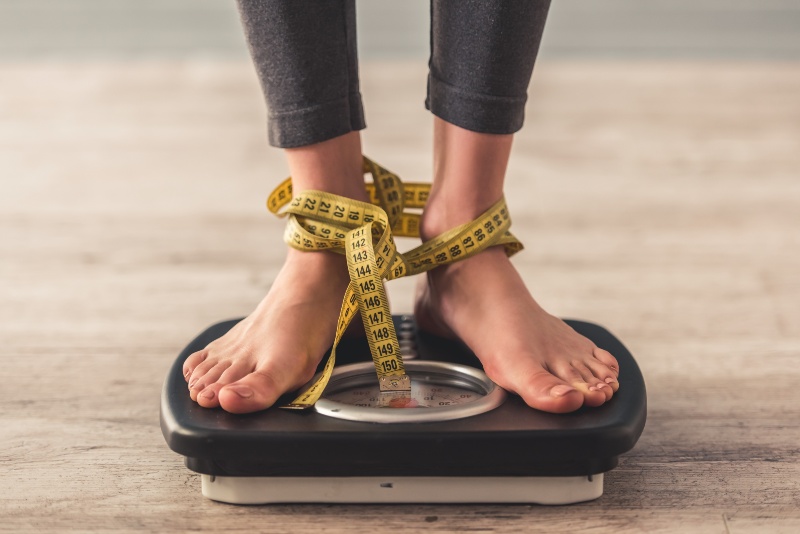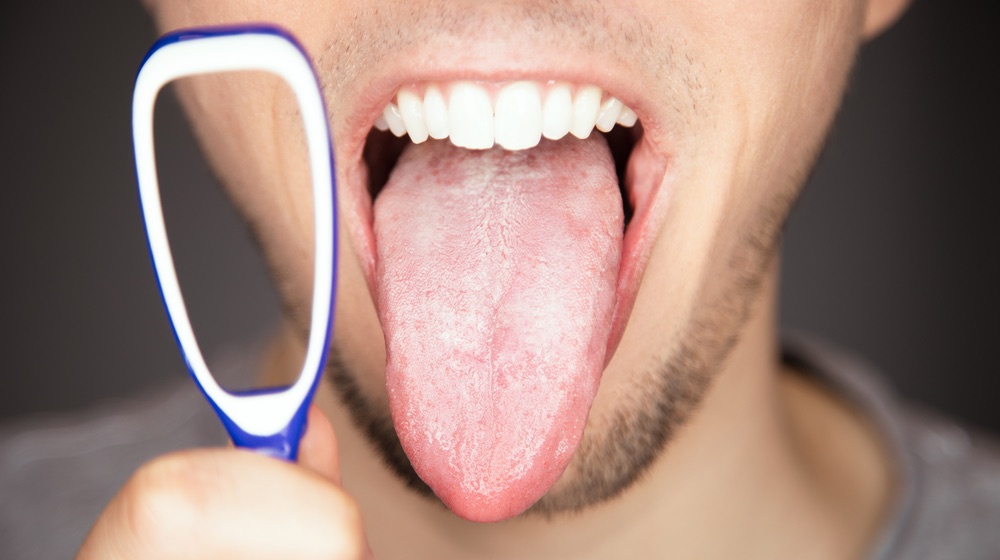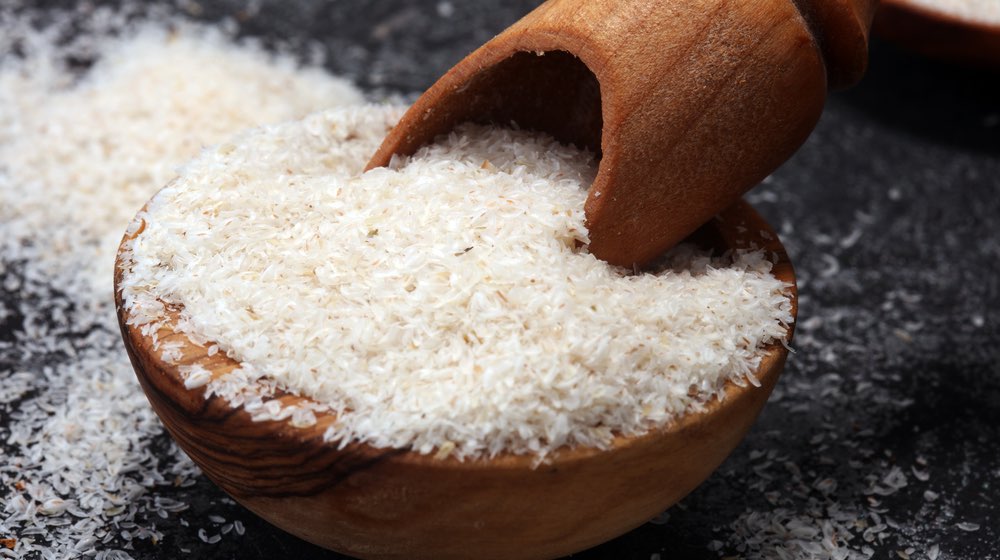7 Signs Of Unhealthy Gut And How To Improve Gut Health
Your gut, or gastrointestinal (GI) tract, is responsible for the digestion and nutrient absorption in your body. And an unhealthy gut can cause harm to your overall health.
Here are warning signs that your gut needs help, including ways on how you can fix it.
RELATED: Elite Runners' Gut Bacteria Are Making Mice More Athletic
Listen to Your Gut: Signs That You Have an Unhealthy Gut and Ways to Treat It
7 Symptoms of an Unhealthy Gut You Shouldn't Ignore
1. Unintentional Changes in Your Weight

Your weight can fluctuate daily. In fact, you can either lose or gain up to six pounds within a day, especially when you change your diet or intensify your workout. However, it's another story if your weight fluctuates even without changing anything in your lifestyle.
Losing or gaining weight unexpectedly can be a symptom that something's not right inside your gut.
An imbalance in your gut microbiome, or the microorganisms present in your GI tract, can weaken your body's ability to break down food and absorb nutrients. Additionally, it can change your blood glucose and energy levels. All these contribute to how many pounds you're losing or gaining.
Your digestive system's inability to utilize blood sugar can lead to weight gain. Meanwhile, excessive bacteria in your small intestine can result in weight loss.
2. Autoimmune Diseases and Suppressed Immune System

A healthy immune system means a healthy gut. And a compromised immunity suggests an unhealthy gut.
This is because 70% of your immune system lives in your gut. So if your gut is out-of-balance, your immune response and health are affected.
In addition, poor gut health can cause inflammation in your body. This inflammation can lead to autoimmune disorders, wherein your body's defense system can't differentiate your healthy cells and foreign bodies. This results in your body attacking your own cells by mistake.
3. Mood Swings, Anxiety, and Depression

Your gut doesn't only help you digest food; it also aids in balancing your feelings and emotions.
There's a connection between your brain and your gut. This relationship can influence your mental health. So if you feel like you're not in your best self, one possibility is that there's a problem with your gut.
An unhealthy gut can decrease your brain's ability to release dopamine and serotonin. These hormones are your feel-good neurotransmitter and mood stabilizer.
Some people take medicines to regulate their hormone levels. However, there's a chance that supporting your gut can help balance those levels naturally.
4. Skin Problems

If beauty ointments or creams seem ineffective in treating your breakouts, there might be another solution.
Your gut and your skin actually have an intimate relationship with each other, known as the “gut-skin axis“. That's why several skin issues can surprisingly be symptoms of unhealthy gut.
The lining of a poor gut can have holes or cracks. This damage can cause toxins and germs to “leak” and penetrate other tissues. This condition is called “leaky gut”.
A leaky gut can irritate your skin, leading to skin disorders, such as:
- Dry skin
- Eczema
- Acne
- Psoriasis
- Rashes
- Rosacea
5. Frequent Stomach Discomfort

A balanced gut won't have any problem breaking down food and cleaning waste. So if your digestive system seems to be frequently upset, it could mean that you have an unhappy gut.
Instability in your GI tract bacteria, known as dysbiosis, can contribute to the development of irregular bowel movements. With this, you may experience any of the following stomach issues:
- Distension
- Bloating
- Constipation
- Abdominal pain
- Diarrhea
While these conditions are common, they're telltale signs of an unhealthy gut, especially if they happen on a regular basis.
6. Poor Sleep Habits and Chronic Fatigue

If you've already followed every sleep hygiene tip but still toss and turn at night, you may want to check your gut health.
About 90% of your serotonin, a hormone that induces sleep, is produced in your GI tract. Therefore, if your gut is faulty, your sleep cycle can also get messed up. This can give you sleepless nights and cause extreme tiredness during the day.
If you neglect these signs of poor gut health, you're setting yourself up for long-term effects of sleep disturbances. These can weaken your cognitive abilities and energy levels.
7. Food Intolerance

Do you avoid eating certain types of food because your body can't digest them?
If so, this could be due to poor gut health.
Your gut ensures that the food you eat will enter your digestive system. And anything that isn't digested will exit to the other end.
However, if your gut barrier is damaged, which shouldn't be the case, substances can escape and get into your bloodstream. When this happens, your body sets an immune response and strikes them. This response is called food intolerances.
You may start taking care of your gut by identifying your food intolerances. Some of the most usual examples are dairy and gluten.
RELATED: Are Your Gut Microbes Eating Away At Your Medication
7 Ways to Balance Your Gut Health
1. Get Moving

Exercising can get your gut back on track.
Based on a study, physical fitness can grow the diversity of your gut microbiome. Another study also shows that the more active you are, the more diversified your microbiome is.
Tip: If you have an inactive lifestyle, you may start small by working out few days a week. After a week or two, you may pump up the intensity, and make it part of your daily routine.
2. Stay Hydrated

Drinking enough water is essential for proper digestion. Therefore, staying well-hydrated can help your gut health.
Eight glasses of water are perhaps the most commonly recommended amount per day. However, according to the Institute of Medicine (IOM), your water intake depends on several factors. These include your sex, age, activity, and environment.
For instance, men should drink at least 13 cups of water per day, while women must have nine cups. But if you're breastfeeding or pregnant, your goal is to drink 10 to 13 cups every day.
3. Do Intermittent Fasting

Intermittent fasting pertains to limiting your eating schedule to a short period of time. For example, you eat for eight hours, then you fast for the remaining 16 hours of the day.
Doing intermittent fasting can stimulate the increase of good bacteria for a healthier gut. Giving your GI tract a break can contribute to a normal immune response, decrease bloating, and lose water weight.
4. Improve Your Sleep

This tip might sound frustrating because, as stated above, lack of sleep is a sign of an unhealthy gut. But that makes it even more crucial to fix your sleep routine. Because if you don't, you'd just find yourself in an endless sleepless cycle.
You may get rid of your sleep disorder by changing your habits.
For instance, you may set a sleep schedule, and be sure to strictly follow it, whether during business days or vacation. Additionally, avoid drinking coffee late in the afternoon, and put your phone away an hour before bedtime.
5. Eat Clean

Your diet influences your gut bacteria.
To achieve a balance in your gut, add the following foods to your diet:
Whole Grains
Not all carbs are bad for your health.
Whole grains are a good source of iron, fiber, selenium, vitamin B, and magnesium. These aren't digested in your small intestine. Instead, they go to your large intestine. Your gut bacteria feast on them, and they help increase good gut bacteria.
Fruits and Vegetables
These foods are rich in fiber, which is vital to keep your gut healthy. Some great examples are:
- Raspberries
- Chickpeas
- Legumes
- Lentils
- Artichoke
- Broccoli
- Green beans
Fermented Foods
Fermentation is a process wherein microorganisms, such as bacteria, convert carbohydrates into organic acids or alcohol for food preservation. Consuming fermented foods can increase the number of good bacteria in your gut.
Some examples include:
- Sauerkraut
- Tempeh
- Kefir
- Yogurt
- Kimchi
- Kombucha
- Miso
On the other hand, you have to minimize or eliminate your intake of artificial sweeteners.
A study reveals that some artificial sweeteners were found to be dangerous to the gut microbiome of mice. This suggests that sugar substitutes may affect gut microbial activity, which may lead to several health problems.
Tip: Eat slowly. Properly chewing your food can enhance your digestion. This may prevent digestive problems and promote a healthy gut.
6. Manage Stress

Do you experience digestive discomfort when you're stressed?
This is because stress affects your body system, especially your gut.
It may seem impossible to completely eliminate stress, but it's essential that you restore zen into your life. You may engage in the following techniques to relax your mind and body:
- Spending quality time with your loved ones
- Laughing
- Reducing your workload
- Meditating
- Playing with your pet
- Journaling
- Getting a massage
- Doing yoga
7. Take Probiotic Supplements

Probiotics are live microorganisms that can boost your health and keep the good bacteria in your system. Think of them as good cops that chase the bad guys in your body, bringing balance in your gut microbiome.
In fact, a study shows that regular intake of probiotic supplement provided nutritional support to digestive health.
Talk to your doctor before choosing a probiotic supplement, especially if you're taking other medications.
Watch this video by caltech to learn about the connection between Parkinson's disease and gut bacteria:
Your gut can control your overall health. Medical experts even call it the “second brain“, as it behaves and operates independently of our central nervous system.
You can make changes to your lifestyle to restore your gut health. However, if you're still experiencing any of these signs of an unhealthy gut, consult your healthcare provider to make sure that everything's functioning properly.
What other steps should you take to enhance your gut health? Please share your thoughts with us in the comment section below!
Up Next:
- 5 Common Health Problems For Men Over 50
- Top 10 Preventive Care Tests You Need at Ages 50 and Above
- Testicular Cancer Survivor, Matt Ode, Shares His Story of Hope, Purpose, and “Winning the Day” [PODCAST]
Calling all Health Buffs! If you’ve got the gift of keeping healthy and sharing this knowledge through writing, click here if you want to write for us.
Please stay connected with us on Facebook, Twitter, Instagram, and Pinterest, and make sure to join our community of healthy living and minded people here.
Trending
Tongue Color | 7 Scary Tongue Color Meanings
Lecithin Benefits and Side Effects: 10 Surprising Truths
Get Updates
SIGN UP FOR OUR NEWSLETTER TODAY

Tongue Color | 7 Scary Tongue Color Meanings

Lecithin Benefits and Side Effects: 10 Surprising Truths

Related

Tongue Color | 7 Scary Tongue Color Meanings

